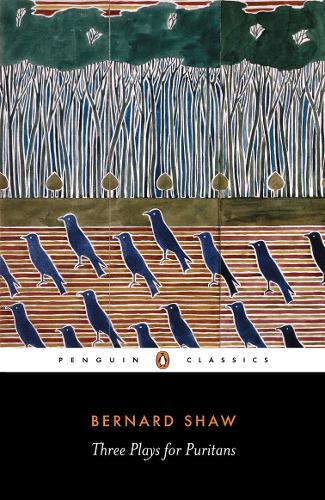
Three Plays for Puritans
(Paperback)
Publishing Details
Three Plays for Puritans
By (Author) George Bernard Shaw
Edited by Dan Laurence
Introduction by Michael Billington
Penguin Books Ltd
Penguin Classics
8th August 2000
United Kingdom
Classifications
General
Non Fiction
822.912
Physical Properties
Paperback
368
Width 129mm, Height 198mm, Spine 21mm
269g
Description
Shaw believed that theatre audiences of the 1890s deserved more than the hollow spectacle and sham he saw displayed on the London stage. But he also recognized that people wanted to be entertained while educated, and to see purpose mixed with pleasure. In these three plays of ideas, Shaw employed traditional dramatic forms - Victorian melodrama, the history play and the adventure story - to turn received wisdom upside down. Set during the American War of Independence, The Devil's Disciple exposes fake Puritanism and piety, while Caesar and Cleopatra, a cheeky riposte to Shakespeare, redefines heroism in the character of the ageing Roman leader. And in Captain Brassbound's Conversion, an expedition in Morocco is saved from disaster by a lady explorer's skilful manipulation of the truth.
Reviews
By the Winner of the Nobel Prize in Literature
"[Shaw] did his best in redressing the fateful unbalance between truth and reality, in lifting mankind to a higher rung of social maturity. He often pointed a scornful finger at human frailty, but his jests were never at the expense of humanity." --Thomas Mann
"Shaw will not allow complacency; he hates second-hand opinions; he attacks fashion; he continually challenges and unsettles, questioning and provoking us even when he is making us laugh. And he is still at it. No clich or truism of contemporary life is safe from him." --Michael Holroyd
"In his works Shaw left us his mind. . . . Today we have no Shavian wizard to awaken us with clarity and paradox, and the loss to our national intelligence is immense." --The Sunday Times
"He was a Tolstoy with jokes, a modern Dr. Johnson, a universal genius who on his own modest reckoning put even Shakespeare in the shade." --The Independent
"His plays were superb exercises in high-level argument on every issue under the sun, from feminism and God, to war and eternity, but they were also hits--and still are." --The Daily Mail
Author Bio
Dublin-born George Bernard Shaw (1856-1950) was an active Socialist and a brilliant platform speaker. He was strongly critical of London theatre and closely associated with the intellectual revival of British drama. Dan H. Laurence (series editor) has edited Shaw's Collected Letters and Collected Plays with their Prefaces. He was Literary Advisor to the Shaw Estate until his retirement in 1990. Michael Billington (introducer) has been Drama Critic of the Guardian since 1971.
